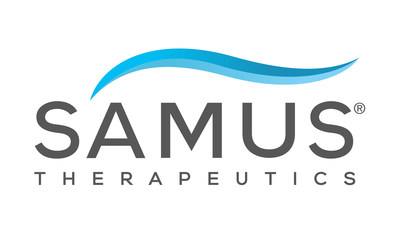Samus Therapeutics, Inc., a privately held, Boston-based biopharmaceutical company developing epichaperome inhibitors to treat central nervous system diseases and hematologic malignancies, announced the publication of an open article in Nature Communications.
BOSTON, Sept. 2, 2021 /PRNewswire/ -- Samus Therapeutics, Inc. ("Samus Therapeutics" or the "Company"), a privately held, Boston-based biopharmaceutical company developing epichaperome inhibitors to treat central nervous system (CNS) diseases and hematologic malignancies, today announced the publication of an open article in Nature Communications. The article highlights the role of epichaperome chemical probes in CNS diseases, including glioblastoma, and their therapeutic relevance with epichaperome inhibitors such as icapamespib (PU-AD), the Company's lead development candidate. The study was led by Gabriela Chiosis, PhD, Member of the Chemical Biology Program at the Sloan Kettering Institute at Memorial Sloan Kettering Cancer Center. The Company is currently initiating a Phase 1b study of PU-AD in recurrent malignant glioma at sites across the U.S., including Memorial Sloan Kettering and the MD Anderson Cancer Center.
The article titled, "Chemical tools for epichaperome-mediated interactome dysfunctions of the central nervous system," highlights that the survival of glial stem cells and tumor endothelial cells in glioblastoma is dependent on epichaperome formation, positioning epichaperome inhibition with PU-AD as a novel treatment approach.
Studies with human glioblastoma explants, primary and secondary neurospheres, and glial stem cells indicate that some glioblastomas express high levels of epichaperomes and treatment response to PU-AD directly correlates with epichaperome expression levels. The authors also introduce proprietary methods to detect and quantitate epichaperome levels in mouse xenograft brain tumors.
"Epichaperome formation is a disease mechanism," commented Barbara Wallner, PhD, Chief Scientific Officer of Samus Therapeutics. "Epichaperomes are essential for the maintenance and propagation of the pathologic cellular phenotype in glioblastoma and neurodegenerative diseases, our focus with the clinical development of PU-AD, which has demonstrated the blood brain barrier permeability necessary to treat these diseases."
"The findings in the Chiosis article that PU-AD treatment inhibits epichaperomes in xenograft mouse models and in ex vivo studies with patients' tumor explants resistant to temozolomide and bevacizumab indicates that PU-AD could have a clinical role in treating the devastating disease more generally referred to as glioblastoma," added Dr. Wallner.
Disclosures: Dr. Chiosis has intellectual property and financial interests related to Samus Therapeutics. Memorial Sloan Kettering has intellectual property rights and associated interests by virtue of licensing agreements between Memorial Sloan Kettering and Samus Therapeutics.
About Samus Therapeutics
Samus Therapeutics is a privately held Boston-based biopharmaceutical company developing orally administered icapamespib (PU-AD, PU-HZ151) and zelavespib (PU-H71) that target the epichaperome, also termed the stress chaperome, to address the breakdown of regulatory pathways that normally prevent aggregation and accumulation of disease associated aberrant proteins in CNS diseases and oncogenic protein signaling pathways in cancer.
This press release contains certain forward-looking information about Samus Therapeutics, Inc. that is intended to be covered by the safe harbor for "forward-looking statements" provided by the Private Securities Litigation Reform Act of 1995, as amended. Forward-looking statements are statements that are not historical facts, and in some cases can be identified by terms such as "may," "will," "could," "expects," "plans," "anticipates," "forecasts," and "believes." These statements include, but are not limited to, statements regarding the progress, timing and results of preclinical and clinical trials involving the Company's drug candidates, and the progress of the Company's research and development programs. All such statements are subject to certain risks and uncertainties, many of which are difficult to predict and generally beyond the control of the Company, that could cause actual results to differ materially from those expressed in, or implied by, the forward-looking statements. These risks and uncertainties include, but are not limited to whether any of our therapeutic candidates will advance further in the preclinical or clinical trials process and whether and when, if at all, they will receive final approval from the U.S. Food and Drug Administration or equivalent foreign regulatory agencies, whether our products will be successfully marketed if approved; the strength and enforceability of our intellectual property rights; and competition from other pharmaceutical and biotechnology companies. While Samus Therapeutics may elect to update these forward-looking statements at some point in the future, it specifically disclaims any obligation to update or revise any forward-looking-statements contained in this press release whether as a result of new information or future events, except as may be required by law.
![]() View original content to download multimedia:https://www.prnewswire.com/news-releases/samus-therapeutics-announces-publication-of-study-on-epichaperome-chemical-probes-in-nature-communications-301367812.html
View original content to download multimedia:https://www.prnewswire.com/news-releases/samus-therapeutics-announces-publication-of-study-on-epichaperome-chemical-probes-in-nature-communications-301367812.html
SOURCE Samus Therapeutics, Inc.





